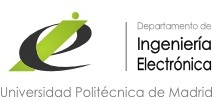Methodology
The teaching methodology designed for the studies of Doctorado en "Sistemas Electrónicos" (DSE) takes into account the context in which it is developed, and especially two fundamental conditions:
- The fast development of science and technology in the field of electronic systems.
- The wide range of specialized knowledge required.
The first condition requires the guidance of graduate teaching towards learning processes comprising constantly updated knowledge and the basis that support them, which requires the development of initiative and independent work. The goal is for the students to assimilate the relevant knowledge that will enable him/her to cope successfully with future research or professional work, while adapting to a highly changing technological environment. The second condition determines a careful selection of the topics covered in each subject, properly balancing the scientific knowledge in which the scheduled course contents are established and the state of the art at all times, and focusing on areas of difficulty which is an object of interest in the scientific comunity.
The teaching methodology comes from a planning of each PhD student's curriculum. This planning is facilitated by the requirement that the students must choose an academic tutor with whom an interviews should be held regularly, starting with an initial one that will determine the subjects in which they will be enrolled, including occasionally those from external PhD programs suggested by the tutor.
Among the specific teaching methods to be used in the subjects of this PhD program, the following stand out:
- The master class, dynamic in terms of interaction with students, made possible because of the moderate number of students (on average 8 students per course). The proper orientation of the classes taught and the stimulation towards the independent work of students is provided through a careful selection of bibliographic resources. The aim is to impart the knowledge appropriate to the subject and prepare students to address the remaining tasks contained in the teaching methodology for each subject.
- Carrying out theoretical or practical exercises, individual or in teams, including their resolution on paper, experiments in the lab, use of IT tools or implementing algorithms in any programming language. The aim is to verify to what extent the student has managed to acquire the basic knowledge needed to address the broader tasks successfully and, where appropriate, encourage teamwork habits.
- Carrying out major projects, individual or in teams, including theoretical and/or practical tasks, drawing up the corresponding scientific and technical report. In the process, the teacher acts as a supervisor. The objectives pursued are to provide students with the opportunity to study in depth a specific line related to the subjects being taught, developing the qualities of analysis and evaluation; promote their capacity to generate scientific and technical documentation, and encourage interaction within teamwork.
- Oral presentation of the results of the aforementioned research work in order to educate the students' communication skills, emphasizing aspects of order, clarity, conciseness and accuracy.
- Seminars whose primary goal is the expansion of knowledge in a specific subject. The role of the teacher is more active in seminars, from being a mere supervisor to becoming a member of the team. Thus, it encourages the creation of an enabling environment for teaching by establishing real collaboration links between teachers and students. This aspect is considered in a special way, by proposing extra-curricular seminars, as a way of promoting the student's motivation through themes related to their main activity, as well as expanding their vision.
- Conducting group discussions, to enhance the students'capabilities of criticism and assessment. The issues raised can range from general aspects of the subject taught, to the critical analysis of a work or research text included in the bibliography. Discussions can arise from a previous presentation by a student, or as an open discussion with a moderator. The role of the professor can be that of an observer or an active participant, even as a moderator.

